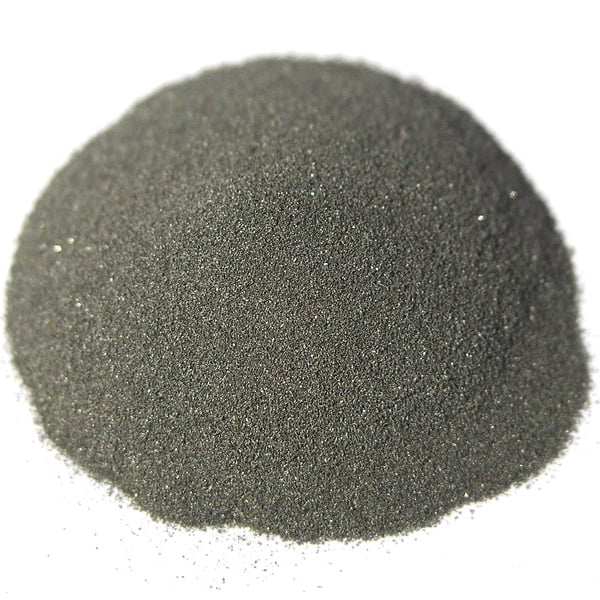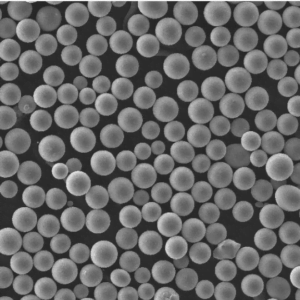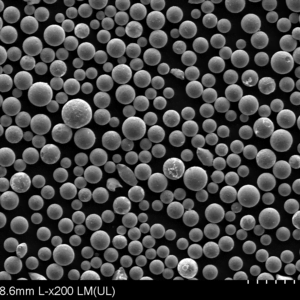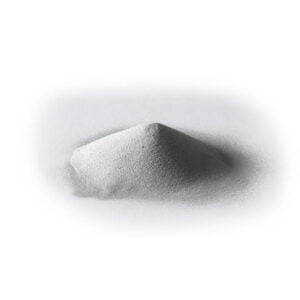Rent titanpulver
Titanpulver är ett metallpulver tillverkat av titanmetall. Det kännetecknas av sitt höga förhållande mellan styrka och vikt, korrosionsbeständighet och biokompatibilitet. Titanpulver har många olika användningsområden inom branscher som flyg- och rymdindustrin, medicinteknik, bilindustrin och konsumentprodukter.
Låg MOQ
Tillhandahålla låg minsta orderkvantitet för att möta olika behov.
OEM & ODM
Tillhandahålla kundanpassade produkter och designtjänster för att tillgodose unika kundbehov.
Tillräckligt lager
Säkerställa snabb orderhantering och tillhandahålla tillförlitlig och effektiv service.
Kundtillfredsställelse
Tillhandahålla högkvalitativa produkter med kundnöjdhet i fokus.
dela denna produkt
Innehållsförteckning
Översikt över rent titanpulver
Titanpulver är ett metallpulver tillverkat av titanmetall. Det kännetecknas av sitt höga förhållande mellan styrka och vikt, korrosionsbeständighet och biokompatibilitet. Titanpulver har många olika användningsområden inom branscher som flyg- och rymdindustrin, medicinteknik, bilindustrin och konsumentprodukter.
Den här artikeln ger en omfattande guide till titanpulver. Den täcker sammansättning, egenskaper, tillämpningar, specifikationer, leverantörer, hantering, inspektion, jämförelser, för- och nackdelar och vanliga frågor om titanpulver. Kvantitativa data presenteras i lättlästa tabeller för snabb referens.
Sammansättning av titanpulver
Titanpulver kan vara ren titan eller en legering som innehåller titan som huvudelement. Sammansättningen avgör egenskaper och användningsområden.
| Sammansättning | Detaljer |
|---|---|
| Ren titan | Innehåller >99% titan. Lägst hållfasthet men utmärkt korrosionsbeständighet. |
| Ti-6Al-4V | 6% aluminium, 4% vanadin. Vanligaste titanlegeringen med hög hållfasthet. |
| Ti-3Al-2,5V | 3% aluminium, 2,5% vanadin. Högre duktilitet än Ti-6Al-4V. |
| Ti-6Al-7Nb | 6% aluminium, 7% niob. Högre hållfasthet för flyg- och rymdtillämpningar. |
| Ti-15Mo-3Nb-3Al-0.2Si | 15% molybden, 3% niob, 3% aluminium, 0,2% kisel. Beta titanlegering. |
Titanpulver kan också blandas med andra elementpulver som järn, aluminium eller bor för att skapa skräddarsydda legeringar.
Egenskaper hos titanpulver
Titans unika egenskaper gör det lämpligt för krävande tillämpningar inom olika branscher.
| Fastighet | Beskrivning |
|---|---|
| Hög hållfasthet | Har ett utmärkt förhållande mellan hållfasthet och densitet, nära höghållfasta stål. |
| Låg densitet | Väger 60% mindre än stål eller nickellegeringar. |
| Korrosionsbeständighet | Bildar en stabil TiO2 oxidfilm för korrosionsskydd. |
| Biokompatibilitet | Icke-toxisk och kompatibel med mänskliga kroppsvävnader. |
| Värmebeständighet | Bibehåller mekaniska egenskaper upp till 600°C. |
| Icke-magnetisk | Användbar för icke-magnetiska applikationer. |
| Gnistfri | Säkrare för brandfarliga miljöer jämfört med stål. |
Egenskaperna kan justeras genom att ändra sammansättning, kornstorlek, porositet och bearbetningsmetod.
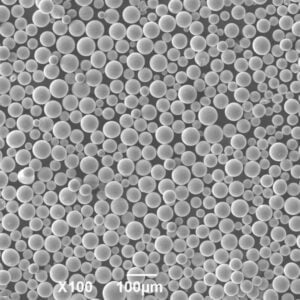
Användningsområden för titanpulver
De mångsidiga egenskaperna hos titanpulver möjliggör unika tillämpningar inom följande branscher:
| Industri | Tillämpningar |
|---|---|
| Flyg- och rymdindustrin | Motorkomponenter, flygplansstrukturer, rymdfarkoster |
| Medicinsk | Implantat, kirurgiska instrument, medicintekniska produkter |
| Fordon | Kopplingsstavar, ventiler, fjädrar, fästelement |
| Kemisk | Korrosionsbeständiga kärl, värmeväxlare, rör |
| Sportartiklar | Golfklubbor, tennisracketar, cyklar, hjälmar |
| Additiv tillverkning | 3D-utskrivna delar för flyg-, fordons- och medicinteknik |
Titans biokompatibilitet gör den idealisk för implantat och medicintekniska produkter. Dess korrosionsbeständighet gör det lämpligt för havsvattentillämpningar. Den höga hållfastheten är användbar för kritiska komponenter inom flyg- och rymdindustrin.
Specifikationer för titanpulver
Titanpulver finns i olika storlekar, former, renhetsgrader och sammansättningar för att passa specifika applikationer.
| Parameter | Specifikationer |
|---|---|
| Partikelstorlekar | 15-45 mikrometer, 45-105 mikrometer, 105-250 mikrometer |
| Partikelns form | Sfärisk, kantig, blandad morfologi |
| Renhet | Grad 1 (99,2% Ti), Grad 2 (99,5% Ti), Grad 4 (99,9% Ti) |
| Legeringsklasser | Ti-6Al-4V, Ti-6Al-7Nb, Ti-64, Ti-1023 |
| Produktionsmetod | Gasatomisering, plasmaatomisering, hydrid-dehydrid |
Partikelstorleksfördelningen, morfologin, syre-/kvävehalten och mikrostrukturen styrs enligt applikationskraven.
Leverantörer av titanpulver
Titanpulver levereras av ledande tillverkare av metallpulver globalt:
| Leverantör | Plats |
|---|---|
| AMETEK | USA |
| AP&C | Kanada |
| TLS Teknik | Tyskland |
| Tekna | Kanada |
| Metallys | STORBRITANNIEN |
| Praxair | USA |
| Rio Tinto | Kanada |
| ATI Pulvermetall | USA |
| CNPC Powder Group | Kina |
Priserna på titanpulver varierar från $50/kg till $500/kg baserat på renhet, partikelstorlek, produktionsmetod och ordervolym. Anpassade legeringar, speciella partikelmorfologier och strikta toleranser kostar mer.
Hantering och förvaring av titanpulver
Särskilda försiktighetsåtgärder krävs vid hantering av titanpulver för att förhindra bränder, explosioner och skador på egendom:
- Förvaras svalt, torrt och i inerta miljöer, skyddat från fukt, gnistor och lågor
- Använd ledande behållare som är jordade för att förhindra uppbyggnad av statisk laddning
- Lokal avgasventilation rekommenderas för att kontrollera damm
- Undvik ansamling av damm för att minimera explosionsrisken
- Använd dammskyddsmask, skyddsglasögon och handskar för att förhindra inandning och hudkontakt
- Följ anvisningarna i säkerhetsdatabladet (MSDS) för säker hantering
Inspektion och provning av titanpulver
Titanpulverbatcherna testas för att säkerställa att de uppfyller de nödvändiga materialspecifikationerna:
| Testmetod | Parameter Uppmätt |
|---|---|
| Analys av siktar | Fördelning av partikelstorlek |
| Laserdiffraktion | Fördelning av partikelstorlek, medelstorlek |
| Skannande elektronmikroskopi | Partikelmorfologi, mikrostruktur |
| Energidispersiv röntgenspektroskopi | Kemisk sammansättning |
| Röntgendiffraktion | Fasens sammansättning |
| Spektrofotometri | Syre-, kväve- och väteinnehåll |
| Tappdensitet | Skenbar densitet, flytbarhet |
| Pyknometer | Skelettets täthet |
Provtagning och testning enligt ASTM-standarder säkerställer titanpulverkvalitet för kritiska applikationer.
Jämförelse av titanpulver med alternativ
Titan har fördelar och nackdelar jämfört med ersättningsmaterial:
| Titan | Aluminium | Rostfritt stål | |
|---|---|---|---|
| Täthet | Låg | Lägre | Högre |
| Styrka | Hög | Medium | Hög |
| Korrosionsbeständighet | Utmärkt | Bra | Bra |
| Temperaturbeständighet | Bra | Medium | Bättre |
| Kostnad | Hög | Låg | Medium |
| Magnetisk permeabilitet | Låg | Låg | Hög |
| Biokompatibilitet | Utmärkt | Dålig | Bra |
Titan utmärker sig för sin korrosionsbeständighet och biokompatibilitet trots sin högre kostnad. Aluminium och rostfritt stål kan vara billigare alternativ beroende på applikationskraven.
För- och nackdelar med titanpulver
| Proffs | Nackdelar |
|---|---|
| Högt förhållande mellan styrka och vikt | Dyrt jämfört med stål |
| Korrosionsbeständig | Reaktivitet med syre vid höga temperaturer |
| Giftfri och icke-allergiframkallande | Låg elasticitetsmodul kan innebära återfjädring vid maskinbearbetning |
| Utmärkt biokompatibilitet | Låg värmeledningsförmåga |
| Behåller sina egenskaper vid höga temperaturer | Kräver bearbetning i inert atmosfär |
| Brett utbud av legeringsmöjligheter | Begränsad hållfasthet vid höga temperaturer |
Titanpulver möjliggör lätta och starka detaljer men kräver kontrollerad hantering och bearbetning. Kostnaden är högre än för konventionella legeringar.
Vanliga frågor om titanpulver
Här finns svar på några vanliga frågor om titanpulver:
F: Vad används titanpulver till?
A: Titanpulver används inom flyg, medicin, fordon, kemi och sportartiklar på grund av sin höga hållfasthet, låga vikt, korrosionsbeständighet, värmebeständighet och biokompatibilitet. Det används ofta för kritiska roterande delar i flygplansmotorer, ortopediska implantat, bilkomponenter, värmeväxlare och additivt tillverkade delar.
F: Är titanpulver säkert att hantera?
A: Titanpulver kan antändas och explodera när det är mycket finfördelat och exponeras för luft. Korrekt jordning, inert atmosfär, ventilation och skyddsutrustning är viktigt vid hantering av titanpulver. Det är också icke-toxiskt och allergivänligt vid hudkontakt.
F: Vad är skillnaden mellan titanpulver av klass 1 och klass 5?
A: Titanpulver av grad 1 har högre renhet med lägre syre- och järninnehåll jämfört med grad 5. Grad 1 ger bättre korrosionsbeständighet medan grad 5 ger högre styrka. Grad 5-pulver skulle användas där styrka är kritisk medan grad 1 passar kemiska resistensbehov.
F: Rostar titanpulver?
A: Titan bildar ett ogenomträngligt och självreparerande oxidskikt som skyddar det mot rost och korrosion. Det uppvisar utmärkt korrosionsbeständighet i de flesta miljöer inklusive saltvatten. Denna egenskap gör den lämplig för marina applikationer.
F: Är titanpulver magnetiskt?
A: Nej, titanpulver är icke-magnetiskt. Dess relativa magnetiska permeabilitet är mycket nära 1 vilket gör det användbart för icke-magnetiska applikationer istället för ferritiska stål.
F: Vad är kostnaden för titanpulver?
A: Titanpulver kan variera från $50/kg till $500/kg beroende på renhet, partikelstorlek, produktionsmetod, morfologi och ordervolym. Hög renhetsgrad som är lämplig för medicinsk användning är dyrare. Anpassade legeringar och speciella partikelformer kostar också mer.
F: Vad är skillnaden mellan gasatomiserat och hydrid-dehydrid titanpulver?
S: Gasatomiserat titanpulver har en sfärisk morfologi som är idealisk för additiv tillverkning, medan hydriddehydridpulver har en kantig, oregelbunden form som lämpar sig för pressning och sintring. Pulvrets egenskaper, ytkemi, mikrostruktur och kostnad skiljer sig åt för de två produktionsmetoderna.
F: Hur produceras titanpulver?
A: De viktigaste produktionsmetoderna är gasatomisering, plasmaatomisering och hydrid-dehydridprocess. Gasatomisering med argon eller kvävgas är en vanlig metod för att producera fint sfäriskt pulver för AM. Hydridprocessen genererar kantigt pulver för pressning till former före sintring. Plasmaatomisering kan producera mycket fina sfäriska pulver.
F: Vad är innehållet i ett säkerhetsdatablad (MSDS) för titanpulver?
S: Säkerhetsdatabladet innehåller information om hälsorisker, reaktivitetsdata, toxikologiska data, försiktighetsåtgärder vid hantering, lagringsinformation, spillprocedurer, brandbekämpningsinstruktioner, första hjälpen-åtgärder och riktlinjer för avfallshantering. Det är mycket viktigt att läsa igenom säkerhetsdatabladet innan man arbetar med någon mängd titanpulver.
F: Vilka standarder gäller för titanpulver?
S: Viktiga standarder är ASTM B833 för sfäriskt titanpulver, ASTM B981 för titanlegeringar för pulvermetallurgi, ASTM B988 för gasatomiserat titanlegeringspulver och ISO 22068 för additiv tillverkning med titanlegeringar. Specifikationerna omfattar provtagning, testning, storleksanalys, kemisk analys och kvalitetssäkring.
Få det senaste priset
Om Met3DP
Produktkategori
HOT SALE
KONTAKTA OSS
Har du några frågor? Skicka oss meddelande nu! Vi kommer att betjäna din begäran med ett helt team efter att ha fått ditt meddelande.

Metallpulver för 3D-printing och additiv tillverkning
FÖRETAG
PRODUKT
cONTACT INFO
- Qingdao City, Shandong, Kina
- [email protected]
- [email protected]
- +86 19116340731






